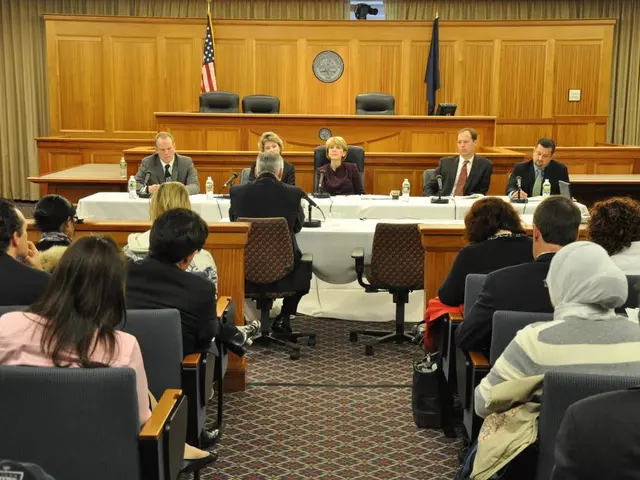Questions and Responses for Behavioral Job Interviews:
Interviewing techniques have evolved to delve deeper into a candidate's professional behavior, moving beyond assessing merely their skillset listed on a resume. Today's interviewers are more interested in understanding real-life scenarios that demonstrate a candidate's competencies and experiences.
To help job seekers prepare for such interviews, a list of 18 behavioral-based interview questions with example answers has been compiled. These questions seek to evaluate a candidate's problem-solving abilities, communication skills, adaptability, leadership qualities, and ability to collaborate effectively.
1. Tell me about a time you had to work with someone with a different personality.
This question aims to determine if a candidate can leverage differences in personalities to improve team performance. In this situation, an employee at Design Co. was partnered with a creative and extroverted graphic designer. Despite their contrasting styles, they found a solution that optimized their individual strengths, enhancing their collaboration and resulting in project success.
2. Describe a situation where you disagreed with a teammate's approach. How did you resolve it?
This question tests a candidate's conflict resolution skills. At a marketing agency, a teammate and I disagreed on the target audience for a social media campaign. Instead of dismissing his idea, we conducted market research to understand customer demographics and developed a two-pronged campaign that catered to both audiences, resulting in expanded reach and exceeded client expectations.
3. Give an example of when you had to delegate tasks within a team.
This question assesses a candidate's ability to assess team members' strengths and weaknesses to efficiently distribute tasks. As a software development team lead, I assigned complex coding tasks to a senior developer while providing a junior developer with simpler tasks to help them learn and gain valuable experience.
4. How do you handle a situation where a team member isn't pulling their weight?
This question evaluates a candidate's ability to motivate and empower underperforming team members. As a team lead at Acme Designs, I employed a caring and collaborative approach to tackle this situation, discovering the root cause of the team member's struggles and offering guidance and support to overcome the creative block.
5. Tell me about when you faced a complex problem at work. How did you approach it?
This question tests a candidate's analytical skills and ability to communicate complex ideas. A data analyst at ABC Research was tasked with resolving an anomaly in a crucial dataset for a client presentation. By breaking down the problem, documenting the issue, reaching out to industry contacts, and developing a revised plan, the data analyst was able to resolve the issue and maintain client confidence.
When facing these types of behavioral interview questions, it is essential to focus on providing specific examples that demonstrate your professional competence and past experiences. By using the STAR method (Situation, Task, Action, and Result) to structure your answers, you can showcase your problem-solving skills, adaptability, and ability to collaborate effectively.
6. In your previous role, describe a situation where you had to adapt to changing weather conditions that affected your work.
Adapting to unexpected circumstances is crucial in every profession, and this question assesses a candidate's ability to be flexible when faced with external challenges. During my tenure as an outdoor tour guide, heavy rainfall canceled multiple tour arrangements, leading to a significant loss in revenue for our company. To carve a path forward, I pivoted the focus to indoor activities and historical sites, modifying tours to cater to customers' interests during inclement weather. This swift adjustment maintained customer satisfaction and helped maintain business operations amidst unfavorable weather conditions.
7. How do you balance the demands of your fashion industry career with personal commitments and lifelong learning?
The interplay between work, personal growth, and education is essential to achieving success in various careers, including fashion. In my pursuit of a fulfilling career in fashion, I capitalize on technology to stay updated with industry trends, attending virtual seminars and webinars while maintaining a balance between work and personal responsibilities. Additionally, I set aside time for self-reflection and self-improvement to ensure personal growth and a healthy work-life balance.
8. Tell me about how your career and business acumen positively impacted the success of a project or venture.
Demonstrating financial savvy and strategic prowess can leave a lasting impression on potential employers. As a project manager at a startup, I identified an area in our budget that could be optimized without compromising the project's quality or timeline. By advocating for this adjustment, I was able to secure additional funding for marketing efforts and ultimately contributed to the successful launch of our product.
9. How do you use the news as a source of knowledge to better understand current industry trends and stay informed on the competition?
Staying current with industry news is essential for competitive advantage and staying informed in today’s dynamic business landscape. In my role as a marketing strategist, I regularly read industry publications and news outlets to monitor trends, competitor activities, and emerging technologies. This diligent practice helps me stay nimble and implement strategies that position our brand and offerings favorably in the market.
10. Describe an instance where your ability to learn quickly and adapt helped you overcome a significant career challenge.
Failure is inherent to professional growth and adapting in the face of setbacks is a key component of resilience. In my previous role as a business analyst, I found myself struggling to grasp a complex financial modeling software. Through consistent effort, late-night study sessions, and seeking guidance from peers, I acquired a strong understanding of the technology and utilized it to develop highly accurate financial models that saved the company time and resources.
11. Tell me about a time when you took on a learning opportunity outside of your career, and how it positively affected your career growth.
Lifelong learning goes beyond professional development; it encompasses personal growth as well. I recognized the importance of staying informed on various topics and pursued a part-time certification in education and self-development. This newly acquired knowledge equipped me with valuable life skills and a fresh perspective, which I was able to apply to my day-to-day tasks to improve efficiency and productivity.








